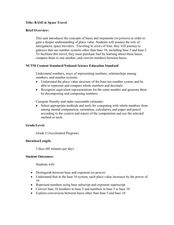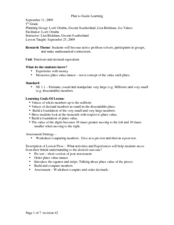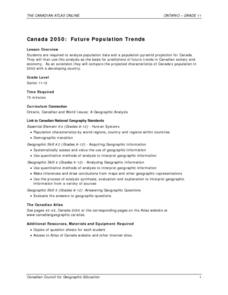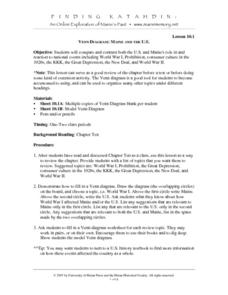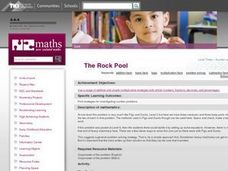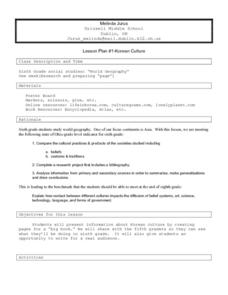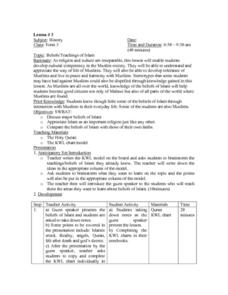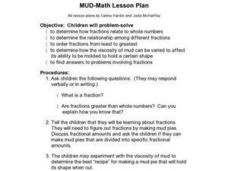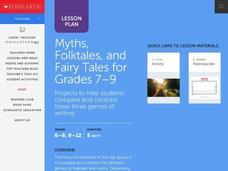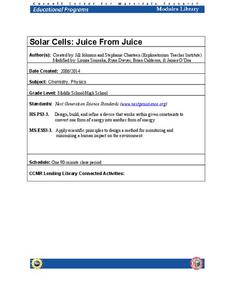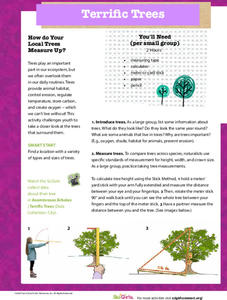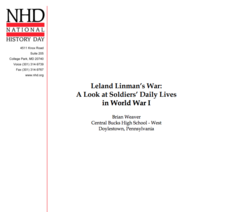Curated OER
BASE-ic Space Travel
For this 3-day place-value lesson, upper-elementary kids investigate the base 5 and base 2 systems as an introduction to exponents and powers. They create a pocket chart to help ground their understanding of bases, exponents, and powers,...
Curated OER
Fractions and Decimal Equivalents: Fifth Grade
Sometimes a skeleton is all you get. This lesson outline provides teachers with a basic lesson flow. Pupils will pre-test, order place value names, use manipulatives, and build and compare numbers. How this is to be done is not...
Curated OER
Prints and Outlines
Students determine the area of two objects by superimposing one on the other. They compare and order the area of different shapes by covering a larger shape with similar smaller ones. They complete these activities as different stations.
Curated OER
Canada 2050: Future Population Trends
Pupils analyze population data and a population pyramid projection for Canada. Using this information, they predict what the future trends in the population might be and its effect on Canadian society as a whole. They compare and...
Curated OER
Adventures With Maps And Globes
First graders examine the differences between a map and a globe. They discuss and identify the symbols on maps and globes, then in small groups complete a worksheet. Students then complete a Venn Diagram comparing maps and globes.
Curated OER
Who We Are: To Know the Characteristics of a Population Within Certain Domains
Learners, through research, discover the characteristics of the population of Quebec and compare them to those of Canada as a whole. They create a class presentation about information they found.
Curated OER
Venn Diagram: Maine And the U.s.
Middle schoolers compare and contrast major events in U.S. histroy using a Venn diagram. They focus on how the events affected their state and the country as a whole. Events expolred include World War I, the Great Depression,...
Curated OER
Waldseemuller's Map: World 1507
Seventh graders analyze various maps. In this Geography lesson plan, 7th graders create a large map as a whole class. Students write a letter to Mr. Waldseemuller.
Curated OER
The Rock Pool
Third graders use number sense and appropriate problem solving techniques to solve the assigned problems. They write out the solutions to the assigned problems. They work in groups to solve the problem before reporting back to the whole...
Curated OER
Korean Culture
Sixth graders complete a research project for the sixth grade Big Book that is to be shared with the 5th graders. Students should take their time because the project represents them and the whole class.
Curated OER
Left-Handers Are All Right
Young scholars examine how left-handed people function in a right-handed world using a web resource. They interview left-handed people to further understand the issue. They share the results of the interview with the whole class.
Curated OER
Converting fraactions and percents
Sixth graders practice the conversion of percents and fractions. They focus on the fact of both fractions and percents are part of a whole. In the independent practice the students also work with solving proportions.
Curated OER
Causal Patterns in Air Pressure Phenomena
Students explore a scientific concept to obtain understanding by performing an experiment. The inquiry can be done in groups or as a whole class. The outcome is that students can use models to obtain futher understanding.
Curated OER
Beliefs/Teachings of Islam
Students listen to a guest speaker lecture on the beliefs of Islam while taking down notes and complete a KWL chart in their notebook. They then discuss in pairs the differences and similarities they note etween Islam and their own...
Curated OER
Mud Pies
Students determine how fractions relate to whole numbers. They determine the relationship among different fractions and order fractions from least to greatest. They
determine how the viscosity of mud can be varied to affect its...
Curated OER
Mozart Tonight/ Ah! Vous dirai-je, maman Theme and Vars. 1,5 and 8
Fourth graders analyze and practice the musical concept of contrasting segments. They view and discuss a musical whole that is described by the connections between the theme and variations and demonstrate the concept by composing...
Virginia Department of Education
Special Right Triangles and Right Triangle Trigonometry
Right triangles are so special! Use special right triangles to discover the trigonometric ratios. Pairs construct special right triangles and find the values of the ratios of the sides. In the process, they discover the ratios stay the...
Scholastic
Myths, Folktales, & Fairy Tales for Grades 7-9
Here is a must-have resource for studying fairy tales, myths, and folktales with your class! It includes instructional ideas, activities, and materials to support a month-long review of these three unique genres of writing.
Cornell University
Solar Cells: Juice From Juice
Unleash the power of ... blackberries! Science superstars create solar cells using the juice of berries or leaves of a citrus tree in an engaging lab. In addition to offering a plethora of resources, the teacher's guide gives background...
PBS
Terrific Trees
Engage in a shady activity to practice measurement techniques. Classes venture outside to collect measurements of various trees, using different strategies to measure the height, trunk circumference, width, and crown size. Then they...
National History Day
Leland Linman’s War: A Look at Soldiers’ Daily Lives in World War I
Hunkering down in the trenches of World War I, Leland Linman decided to write a journal about his experiences. By reading Linman's entries in the fourth installment of an eight-part lesson series, scholars get a firsthand look at life in...
Stanford University
Explosion of the Maine
An intriguing lesson features newspaper articles to help academics understand the political impact of the sinking the Maine and how the American media depicted the event. Scholars also view a presentation, participate in group...
Bantam Books
The Tempest: Kinesthetic Grammar Approach
Though beautiful, William Shakespeare's prose can be inhibiting for learners who are new to his works. A lesson based on The Tempest guides high schoolers through the paraphrasing process, including noting the subjects and verbs to align...
Curated OER
Why Do Governments Exist? Locke, Hobbes, Montesquieu, and Rousseau
Here is a great secondary source reading that includes the primary ideas and philosophies of the famed Enlightenment philosophers: Thomas Hobbes, John Locke, Charles Montesquieu, and Jean-Jacques Rousseau. In additional to discussing...


